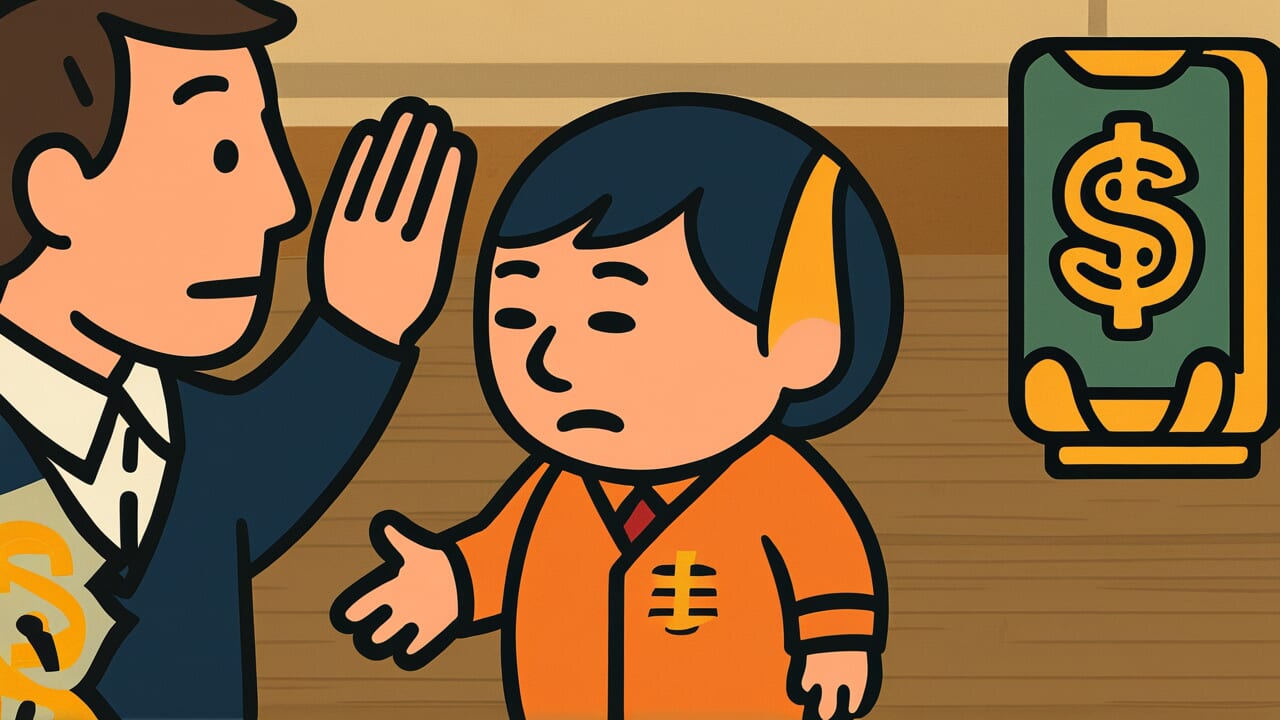How to Read “Every time you meet, you lose five rin”
Aeba gorin no son ga iku
Meaning of “Every time you meet, you lose five rin”
“Every time you meet, you lose five rin” means that meeting people always costs you something. You always end up spending money somehow.
Even when you meet close friends, you spend money. You might buy tea, food, or transportation. You might bring a small gift.
This proverb talks honestly about the money side of relationships. People use it when they want to go out less or save money.
It doesn’t say relationships are bad. Instead, it says we should understand that relationships cost money. We should accept this fact and still value our relationships.
Today, we still spend money when we meet people. We have lunch with friends. We take business clients out. We attend weddings and funerals.
This proverb shows a realistic view of life. It accepts that social activities always cost something.
Origin and Etymology
No one knows exactly where this proverb came from. There are no clear written records. But people think it started during the Edo period among regular people.
Let’s look at the word “five rin.” From the Edo period to the Meiji period, five rin was a very tiny amount of money.
One rin was one-tenth of one sen. Five rin was five times that. It was really, really small.
But for regular people back then, even five rin mattered. They couldn’t ignore such small amounts.
This proverb is interesting because it’s based on real observation. Meeting people always costs money in some way.
When you meet friends, you pay for tea. When you meet acquaintances, you bring a gift. Even at home, you serve snacks.
People in the Edo period felt these small costs every day. They noticed them in their daily lives.
By using “five rin,” such a tiny amount, the proverb becomes funny rather than mean. It’s not criticizing people.
Instead, it’s life wisdom with humor. It accepts the reality that relationships cost money. It does this with a smile.
Usage Examples
- I promised to meet my friend again, but every time you meet, you lose five rin, so my allowance is running low this month
- Family gatherings are fun, but every time you meet, you lose five rin, so I need to prepare gifts and money
Universal Wisdom
“Every time you meet, you lose five rin” perfectly describes something true about relationships. All connections with people come with a cost.
Why was this proverb created? Why has it lasted so long? Because it shows a reality we can’t avoid.
Humans are social creatures. We can’t live alone. But connecting with others always requires giving something.
The cost isn’t just money. It’s also time, effort, and care. These are all things we give to maintain relationships.
What’s interesting is that this proverb doesn’t say to avoid people. Even knowing they’ll “lose” something, people kept choosing to meet.
Why? Because we instinctively know something important. The value we get from relationships is greater than what we lose.
Our ancestors understood that relationships require giving. You can’t maintain relationships without offering something.
But they also knew something else. By accepting these small losses, we gain something richer. Something more valuable.
This proverb contains deep truth. It shows the economics of human society. It also shows our basic human need to connect with others.
When AI Hears This
When people meet and “lose five rin,” information theory can explain this. It’s like the number of possible relationship states decreasing.
Before you meet, there are infinite possibilities. How will they react? What will happen? But after you meet and exchange information, those possibilities become one reality.
In information theory, high uncertainty means high entropy. When things become certain, entropy becomes low.
For example, before flipping a coin, you don’t know if it’s heads or tails. The information is 1 bit. After flipping, it becomes 0 bits.
Human relationships work the same way. Every time you meet, uncertainty decreases. “What does this person think?” “Where will this relationship go?” These questions get answered.
The uncertainty becomes concrete information. And you can’t reverse this process.
What’s interesting is that this process doesn’t always give good results. Before meeting, your expectations include the best possible scenarios.
But when you actually meet, reality is usually average. Statistically, the average of infinite possibilities is always lower than the best case. This is the “loss.”
Also, once information is confirmed, it becomes memory. This memory limits future relationship freedom.
You need to stay consistent with past words and actions. Your choices become narrower over time.
Lessons for Today
This proverb teaches us something important today. We need to accept that relationships always cost something.
In our age of social media, we can connect easily online. That’s why we need to remember the value of meeting in person.
The key is knowing which costs are worth it. You can’t spend the same time and money on every relationship.
For relationships that really matter, pay the cost gladly. For others, don’t force yourself to maintain them.
This balance is the key to building good relationships. It helps you focus on what matters.
This proverb also teaches us that “meeting has weight.” When you can’t meet easily, each meeting becomes more precious.
When you don’t mind small costs, that time becomes valuable. Being aware of costs doesn’t mean being cheap.
It actually means valuing your time with people. It means making that time count.
When you make plans to meet someone, you’re always investing something. But remember this: that investment can grow rich relationships.
It can make your life more colorful and meaningful. The small costs you pay today can bring great rewards tomorrow.



Comments